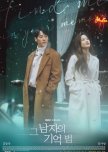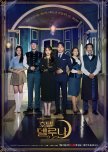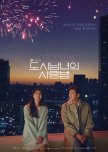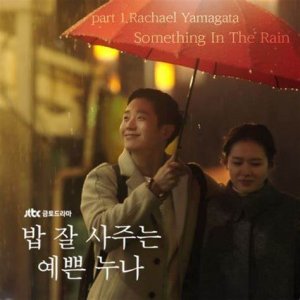
This review may contain spoilers
Poor plotting, lack of chemistry, no identification with leads
The plot is way too contrived and relies on several clichés and ridiculous, forced external conflict to develop. Lack of patient confidentiality is central to how the story develops, which to me is demonstrative of how poor and inorganic the writing is.Overall, I thought this show's plotting was on the bad side of soap opera, with much of the conflict coming from deranged stalker psychos that push the characters forward. At one point in the show, the FL basically says outright that she didn't know if their relationship could last because she was out of danger from a stalker. And that's just it, their relationship seemed fueled by forced feelings of obligation brought about by antisocial deviants, more than from the chemistry of the characters themselves. I don't want characters falling in love because some sick paparazzi pervert pushes them together, but because their feelings emerge naturally from their dynamic, personalities, and freely made choices. Having some shamelessness in setting up a plot is fine, but this show is shameless throughout.
The leads are passable in their independent roles (the ML more than the FL), but I felt like they were poorly suited actors to pair with one another. Visually, they didn't work for me, and I thought their roles and acting were also incompatible. It wasn't convincing to me how their romance developed from antagonistic to loving. I really like this dynamic which is what attracted me to this show, but here it didn't work. Their dynamic seemed more like uncle and niece, since the actor is obviously way older and more experienced than the actress (and yet the age dynamic isn't brought up). She does a bit too much deer-in-the-headlights, doe-eyed listening, especially early, though there were aspects of her characters I thought she did well with. Her friendship with her sister is very engaging and cute (as is the sister's whole character honestly), and she's well-suited to the underestimated, shallow idol type. As far as my viewing went, though, I didn't feel any strong connection to the leads, their motivations, or the choices that they made.
Lastly, I felt like like the ML's powerful memory should have both caused more conflict and been able to solve more problems. The show didn't maximize the potential of its setup and focused too much on a weak, and frankly confusing, backstory plot. I wouldn't recommend this, especially for those who prefer character-driven stories.
Was this review helpful to you?

This review may contain spoilers
Strong leads, enjoyable, but the plot and focus are a bit of a mess
I thought the cast for this was very strong, especially the three leads. Bong Soon and Min Hyuk have near fatal chemistry and that's the clear highlight of this drama. Bong Soon is adorable and Min Hyuk's mannerisms and romantic approach are overpowering. The rival character is also one of the strongest I've seen in this role, even if I had such a strong distaste for him early on. I don't care at all for love triangles but this one was relatively reasonable and well-acted.The show has way, way too much comic relief and non-central character focus, to the point that I felt like every episode had nearly 10 minutes of filler. The comedy itself is often very lowest common denominator (don't get me started on the wine gag and loud is funny humor), though the main character centered comedy is pretty good. I'm also an opponent of overarching psycho pervert thriller-style conflict, though here it sort of makes sense given the comic-book/action movie premise. This conflict trope is extremely overused and very often distracts from what actually works for the central relationships. In my mind, Strong Woman Bong Soon should've been a more focused romcom with episodic villains; for instance, they should've made housing development and local thugs the central source of conflict - the show teases this possibility before diving into the thriller stuff. I think defeating villains and converting them to acquaintances/friends would work way better for the tone this show sets early than using the genius evil sicko. One example of why this fails - the main antagonist, despite the job he has, carries around basically tens if not hundreds of rolls of cash; honestly, if the plot needed it, I'm sure he would've had more money on hand than the ML. He's meant to be taken seriously but the overall presentation of his character doesn't make a lot of sense. The slice of life side of this show is undoubtedly the best part so the conflict should be on that level; as it is, there's a sharp divide between what works tonally and the conflict the show forces.
Also, I didn't like the use of wealth in this show (though I'm not a fan of this dynamic in general). Min Hyuk is a very young CEO entrepreneur-type who's absurdly wealthy and who uses it and its influence to basically coerce the main character to him. I don't like rich guy/poor girl dynamics because it leads to a lot of plot expedients and holes in logic. For instance, "if he is so rich, why didn't he do X, Y, and Z" that anyone with that money would do in the circumstance? Beyond such plotting problems, Bong Soon is also extremely economically dependent on her relationship's success to maintain her job. I think having a character be filthy rich actually robs us of layers that their personality could've taken on otherwise and, in this case, moves the relationship further towards the concerning side of the spectrum. I had to bracket off dimensions of their relationship to fully enjoy it, but Bong Soon as a character is so compelling that eventually the wealth problems fade a bit into the background.
Still, a lot of this could be ignored because the show doesn't take itself too seriously and aims mostly for fun over logic. Even so, I think the lack of a clear focus and the weak overarching conflict are major detriments. I would recommend this because it has so many features that one might connect to when watching. Even if I'm pretty critical above, it has a lot going for it at the character level.
Was this review helpful to you?

This review may contain spoilers
Excellent secondary romance, leads too perfect
This is the first drama I've watched where I found the b romance way, way more compelling than the main one. I liked their parts so much it overcame my apprehension with the rest. I felt really strongly about this show and particularly Huang Yi Lin's character, which I know some people may not care for.I'll start with some criticism so I can work up to what I liked: with the main two, it's a lot of staring contest and creepy disregard for personal space, boundaries, and time- even if it's an idealistic fantasy, they come off as border-line if not outright codependent. In my view, they also have basically no legitimate relationship conflict or tension for most of the series besides the workaholism of their jobs, as well as the resultant obligatory jealousy (which to me is just fake, forced conflict). The jealousy always stems from some nobody fringe character who doesn't have a chance- this plotting is exactly the same as so many other dramas. Next, the childhood best friend card is such a cheap characterization tool in dramas. Memory isn't as vivid as such tropes make it out to be. For instance, it's hard for me to believe that a person would still be tied emotionally to someone they met 20 years before as a kid and haven't had contact within that time. And that such a weird attachment would be reciprocated is 1 in 100 million.
Now, then, I absolutely love the FL's best friend. She's ardent, funny, cute, determined, lonely, and wears her heart on her sleeve. I felt really attached to her emotional ups and downs and the headfirst, honest way she contended with her inadequacies (failed business, ignorance about a lot of things, etc). I'm sure some watching found her annoying but I thought Huang Yi Lin's performance was excellent and became the real heart of the show.
The relationship she has with her bookstore neighbor - a hard-shelled guy who somberly underestimates his value and lovability - is so compelling I don't know why this show isn't centered on them. The main two are flat characters in comparison. In my mind, best friend and bookstore guy's (b) romance is much more grounded in organic, real life emotions like being hung up on the past and thus not being able to takes steps forward into the future. They're such different people that the collision between their personalities (mixed with a shared rootedness in kindness) works very well dramatically. The show goes to too many lengths, by contrast, to make the leads seem basically perfect. Walking through the dynamics of complementary flaws is what make shows like this touching, compelling, and intimate, not seeing some successful, impossibly perfect and fated lovebirds who PDA like maniacs and creepily flirt with each other all the time.
Stylistically, this show has way too much slow motion and just a bit too many sound effects (though it's mild compared to other series). There are some really nice, beautiful shots like in the city and with interior spaces like the bbq shop. The cast has good chemistry overall, though like I said I have my hang ups on the main couple which I don't think good acting could possibly fix.
In most dramas, the viewer would want to be like the main couple given their romantic successes, but this show focuses the intimacy and flirting with them so much that it doesn't seem real. The imperfections and conflict of the b romance, though, does what the show should've done with the leads in making characters that strive to overcome their own deficiencies - along with external problems - to grow closer slowly and incrementally. In doing so, they also work through the setbacks and false starts endemic to this style of relationship-building, thus making the outcome earned rather than gifted by the goddesses of fate.
Was this review helpful to you?

This review may contain spoilers
Strong fantasy set-up and dynamic between leads with ultimately unsatisfying conclusion
I came into Hotel del Luna with several biases, but I enjoyed it for the most part (except for the ending, which I really found unsatisfying). Usually, the fantasy tag is an automatic skip when I'm looking for prospective dramas, since I think the extra layer of contrivance often sets up ridiculous plotting and a lot of fat a show could trim off. I didn't find this to be the case with Hotel del Luna, overall. I'm also not a fan of frequent flashbacks, which this has, but here it makes sense given the nature of the fantasy and the premise. The way they're interlaid into dreams makes sense and so the majority of the setup in the beginning and middle is pretty artful. More superficially, I think the costuming and set design was a definite aesthetic draw - it reminds me a lot of It's Okay to Not Be Okay in how it's used as a supplemental pleasure to the main drama. The music is also nice throughout. Overall, there's a lot of visual and auditory appeal in this.(General spoiler) I really like IU, as most going into this probably do. She does a great job, as does the ML; they have strong on-screen chemistry and their characters' dynamic works well. I do wish their romance was more intimate, though; much of their relationship is threaded through teasing banter, on the one hand, and long-term promises and commitments on the other. As the conclusion was coming up, I felt like the reality of the romance (indicated by the former) faded for the sake of the fantasy-driven resolution (the latter). They flirt but their relationship is weirdly desexualized because IU's character is somehow a 1,300 prude when the chips are down and the ML shows even sarcastic interest. Usually, I think shows can verge too far towards fluffy/intimate, but here I felt like the weight of their choices actually called for the sex/marriage institutionalization more than so many lighthearted shows I've seen that pursue that direction. She kisses him like 3 episodes in - or so it seemed - but that's basically the extent of their romantic intimacy besides some nice chaste hugging. Instead, we get extremely heavy romantic statements of commitment at the expense of fluffiness. Though I typically don't find it necessary (or even desirable to include it), I think having sex and more moments of intimacy in this show could've better shaped the drama at the end and added more levity as well (I think of how that would've fit within the pseudo-gossip the hotel workers had between them). In short, I think the desire to be true to the show's fantasy premise overwhelmed the desire to have a satisfying romance (with all the attendant intimacy), which is ultimately why the ending didn't work for me at all.
(Spoiler) Halfway through, my rating probably would've been closer to an 8.5 or a 9, but the ending made me rethink the parts of the show that I enjoyed from the beginning and middle. My central question throughout the run was, "are they going to be able to stay together in the real world?" But as I got to the end, the creators clearly thought more in terms of "what's the right way for IU's character to atone and thus for us to wrap up the fantasy side of things?" As someone who watched primarily for the romance, the ending was very unfulfilling and frankly didn't make sense to me, especially the ML's actions and what he says to the FL about moving on. I think having reincarnation as a facet of this drama was a fundamental mistake, though one the creators relied a lot on for conflict in the middle and end. Rather, I think the drama of losing immortality and reintegrating into society while dealing with lingering grudges would've been more compelling narrative. I don't think fated relationships - something established in this show via reincarnation - have any real stakes or emotional fulfillment (because choice is circumscribed by destiny), so having the resolution based on some nebulous possibility of meeting again in a reincarnated future does nothing for me. Here, they overcome and change in substantial ways only to lose what's most meaningful to them. Ultimately, the fantasy side of this drama, which I didn't mind for most of the run, led to this kind of unfulfilling conclusion (and on a shameless cameo no less). Like the show's creators, in the end, the main characters are more concerned with an imagined future than with the material reality of living and cultivating romance out of tragic circumstances.
(Spoiler) Rather than romantic or cute, I found the ending to be a weird mix of cynicism and idealism emerging out of the religiously-inflected fantasy. IU's character never lived a real life, never got to be someone because her life was conditioned by the cruel machinations of fate and the stain of vengeance. Once she meets someone with whom she can live and be free, she has to say goodbye because a gaggle of mercurial Fate bitches basically say so. In such a case, it's not clear what the ML should do in his regular life afterward. He falls in love with a gorgeous millennium-old demigod who he makes eternal promises to, but after she moves on, he's supposed to just live basically a regular life? His whole existence at that point is conditioned by the knowledge that his deepest happiness is contingent upon dying and meeting someone he won't remember in a reality he can't fathom. That's not the leap of faith that makes a good romance, but a religious deferral and rejection of the joy of living. The structure of the show really made me think the ending was a punishment of the FL (and the ML by extension), rather than the struggle to move on from her grudge (as it's presented). So the problem, to me, wasn't that the ending is sad (which it is), but that the basis for the resolution - reincarnated future hope - is nonsense and unfulfilling.
Was this review helpful to you?

Smartly made, with some minor concerns about the end
The set up of this is smart and compelling with fluid interview/documentary style montages. These allow it to offer a more panoramic view of relationship questions that come to dovetail in the main romance- I liked this right away.I think the pacing towards the end could have benefitted from expanding further into the leads' relationship. Ultimately, I think the series is too short and could've done a lot more with longer episodes, even if that would've obviated the need for the intercut interviews. Perhaps alternatively it could've abridged the idyllic flashback more in favor of the scenes in the city (part of me thought this should've been called "Lovestruck at the Beach"). Still, I liked the comedy of remarriage style structure (falling in love again) and how that creates a powerful conflict for most of the run.
All in all, a quick watch that's smartly constructed, enjoyable, and features strong acting, especially from the supporting cast.
Was this review helpful to you?

This review may contain spoilers
Slow-burn drama that shirks trope-y plotting for beautiful mood-building
This series traverses the emotional overtones of falling in love in a way that I think is completely distinct from any other k- or c-drama I've seen. Even without such a comparison, I think it's remarkably personal and true to itself.(Spoilers only in paragraphs marked as such).
SitR is beautiful, quiet, deliberate, and grounded in character realism- the storytelling doesn't overextend with cheesy, forced sound effects, throwaway comic relief characters, or distracting child actor flashbacks. Son Ye Jin and Jung Hae-in are absolutely incredible; their performances dovetail artfully with the musical and visual atmospherics. The conflict is organic, for the most part, with no pointless love triangles, sensationalist turns, or completely irrational character choices. The characters have flaws and well expanded personalities, and the aesthetics complement the story very well. The artistic direction is incredibly focused while being subtle and understated. In short, then, I absolutely fell in love with this show because of its emotional poignancy, smart writing, and mature direction.
Perhaps the most divisive thing about SitR is the music. In my first viewing, I absolutely hated the English language songs that make up much of the soundtrack, especially the songs "Stand by Your Man" and "Save the Last Dance for Me." The latter is a very antiquated, kitschy, and ridiculous 80s ballad, while the former sounds like the theme song for traditional gender roles. Even so, when I let the reasoning behind choosing these songs sink in, I felt like they were strong tonal moves overall, especially given that their English language meaning should be considered tangential to the Korean of the series, not as direct thematic cheat sheets. In any case, these eye-rolling songs won me over on rewatch and the rest of the soundtrack is actually excellent- the use of the Flea Waltz is so smart and memorable for punctuating the romantic drama with a lightness that makes it all feel genuine. The repetitions in the soundtrack have become comfortable to me on each watch; despite them being awkward in isolation, looking back now, they leave a powerful memory trace of the show's tones. I would still definitely remove "Save the Last Dance for Me" from the soundtrack, though, if I could.
(Minor spoilers) An underrated choice this show makes is to not reduce the characters to their jobs. I've seen dramas where being a lawyer, doctor, etc. becomes a core aspect of how we understand their personality, but that's not the case here. The FL manages franchise coffee shops, while the ML works in video game design. Rather than the drama focusing on the specifics of these positions, they're used in a mundane way to organically deepen the romance through spontaneity. For instance, the ML uses his art skills to draw a caricature of the FL, while the FL tries to impress him with her coffee brewing ability (here, she leaves a mess for someone else to clean but pretends like it was quick, easy, and routine); such choices ground the characters extremely well, since their romantic moves and choices are in reach of anyone and don't rely on cheesy, over-the-top gestures that work as escapism, as we see in so many dramas. Their jobs complement and enrich their personalities, serve the romance, and don't overwhelm the love story with specialized mumbo jumbo or external conflict that has nothing to do with them. Instead, the conflict comes from within their relationship, from the FL's parents, and from sexual harassment at work. For the last of these, the fact it's at a coffee company isn't as important as the social issue itself. SitR deftly interweaves external conflicts that make sense given the characters' contexts. Such external obstacles sharpen the internal conflicts that are there from the start. I really like how this show threads the romance through this kind of conflict architecture.
I think the weakest part of this show is the conclusion, though I think this is due to the nature of the central conflict. To me, the ending is more symbolic than thorough and complete in resolving things. Still, I think it could've been more cathartic if they had even 5 more minutes to work with for the conclusion and epilogue.
(Major spoilers of ending) Even with the conclusion we get, though, I like how it pushes against an easy, predictable resolution. The FL's last conversation with her mother moves in the direction of working things out, but it stops short. Not every conflict gets resolved in real life, and since this show is largely naturalistic in approach, it makes sense that not everything resolves perfectly and cleanly for the leads. Jeju Island works as borderline if not outright escapism at the end, though, which I've had some reservations about when reflecting on this show since I first watched it. I think it's interest to contrast the symbolic victory (of how they reunite) and this potential interpretation of escapism, since I think the show's ending is a success with the former and a failure with the latter. This is the difference between problem overcome through symbolic reminders and caving into the pressures of the world by leaving it, thereby making the successful romance a fantasy/impossibility of the conflict itself. In the latter case, the resolution is a pretty cynical message about social pressure and its power to corrode love and chase it to the fringes of Korea-- basically, their love can thrive only on Jeju Island, but not on mainland Korea. By contrast, I like to interpret the end through the lens of the symbolic resolution. This involves viewing the ending as an echo back to the early theme of throwing out the past with the umbrella motif. Jeju Island would then symbolize the future reunited with the past now made even more free by the fact that the FL has achieved full independence from her parents' opinions and their impact on her choices. She goes through stages of separating herself from them towards the end of the story, so this decision to return to her real love afterwards perhaps becomes more compelling when viewed as the outcome of such necessary, personal reorientation. What's essential, though, and left unresolved is if their romance can work in the public eye where it faltered earlier; I wish there had been a reference to them taking a leap of faith with their relationship, affirming it beyond the private world they existed and succeeded in early in the show. In short, I wanted a projection of their relationship into the uncertain future, rather than merely a success in the nebulous present.
Something in the Rain is my favorite drama series because of its genuine and understated glimpse at the full modal context of falling in love. I've watched it three times so far and each time I've been deeply moved and impressed by what it's able to do. I absolutely love the two leads as well, and would watch anything either of them is in. They're both the best actors possible for the roles they play here, as well as phenomenal in their own right. I would recommend this to those who want to lose themselves in an experience of falling in love rather than someone looking for dramatic plot twists and turns. This show has had tremendous value and depth to me, beyond a shallow entertainment factor, so I hope others enjoy it as much as I do.
Was this review helpful to you?





